#ministries in uganda
Explore tagged Tumblr posts
Text
Giving Tuesday

View On WordPress
0 notes
Text
Externally Funded Projects: Successes, Challenges, and Future Recommendations
Externally funded projects play a significant role in Uganda’s development, especially in sectors like agriculture, education, health, and infrastructure. However, despite the substantial financial support from external sources, many of these projects face hurdles that limit their overall impact. A recent report by the Ministry of Finance sheds light on the performance of these projects,…
0 notes
Text
WaterAid Uganda and The Ministry of Water And Environment Launch Climate Change Adaptation Project In Eastern Uganda
A Sigh of Relief With The Climate Change Adaptation Project Residents of 11 districts in Eastern Uganda can now look forward to relief from flooding and landslides with the launch of a climate change adaptation project in the Mpologoma water catchment area. This $9.5 million project, funded by the Adaptation Fund, will be executed by WaterAid Uganda in partnership with the Ministry of Water and…
#Climate Change#Flooding#Ministry of Water and Environment#uganda#WaterAid Uganda#WaterAid Uganda and The Ministry of Water And Environment Launch Climate Change Adaptation Project In Eastern Uganda
0 notes
Text
Experiences of Digitizing official Inspection and Certification Systems to enhance SPS compliance for Horticulture exports in Uganda - Technical Session II

Participate to the discussion moderated by the International Plant Protection Convention (IPPC) on International Day of Plants Health 2024.
Speaker: Ms Caroline Mary K. Nankinga, Assistant Commissioner, Phytosanitary and Quarantine from the Ministry of Agriculture, Animal Industry and Fisheries, Republic of Uganda.
Technical session on "Experiences of Digitizing official Inspection and Certification Systems to enhance SPS compliance for Horticulture exports in Uganda" (Virtual)
. Moderator: Mr. Arop Deng, IPPC Secretariat
Theme: Plant health, safe trade and digital technology, 13 May 2024 | 14:00-15:20 (CEST) Sheikh Zayed Centre, FAO, Rome.
#planthealthday#plant health#safe trade and digital technology#technical session#uganda#ministry of agriculture#phytosanitary measures#International Plant Protection Convention (IPPC)#FAO#food and agriculture organization (fao)#idph#Horticulture exports
0 notes
Text









henmazzig
Not all heroes wear capes, but Judge Seburinde sure is. In a dissenting opinion, Uganda’s Judge Julia Sebutinde highlighted the many flaws in the ruling of the International Court of Justice, putting the entire institution to shame. Judge Julia Sebutinde, born in Uganda, initially worked for the Ministry of Justice in Uganda. In 1990, she advanced her education with a Master’s degree from the University of Edinburgh. After graduating in 1991, Julia worked for the Ministry of Commonwealth in the UK and then joined the Ministry of Justice in the Republic of Namibia before being appointed as a Judge of the High Court of Uganda in 1996. In this role, she led several high-profile corruption inquiries into government departments, including the Ugandan Police, the Uganda People’s Defence Force, and the Uganda Revenue Authority, earning significant recognition for her contributions to justice in Uganda. In 2005, Julia was seconded to the Special Court for Sierra Leone, established by the UN to prosecute violations of humanitarian law during the Sierra Leone civil war. She served as the presiding judge in the landmark prosecution of Liberian President James Taylor, who was found guilty of aiding and abetting war crimes and crimes against humanity in 2012. Her exemplary work in international justice earned her an honorary LLD from the University of Edinburgh in 2009. In 2011, Julia achieved a historic milestone by being elected to a judicial seat on the International Court of Justice, becoming the first African woman to serve on the court, where she continues to contribute to global justice. Thank you Judge Seburined, for standing up for justice.
H/T @scartale-an-undertale-au
493 notes
·
View notes
Text
The secret life of Mathilda Weasley
I have a lot of questions about the life of Prof. Weasley before she came to Hogwarts.
First of all, Madam Kogawa tells us that Prof. Weasley was a curse-breaker for the Ministry of Magic.

...and that already raises questions! As far as I know, in the Harry Potter books and in Hogwarts Legacy, the only curse-breakers that we know of work for Gringotts. I think Prof. Weasley is the only curse-breaker we ever encounter that works for the Ministry of Magic.
But was she really working for the Ministry of Magic? In the "Art and Making of Hogwarts Legacy" book, there is a small paragraph about Prof. Weasley:
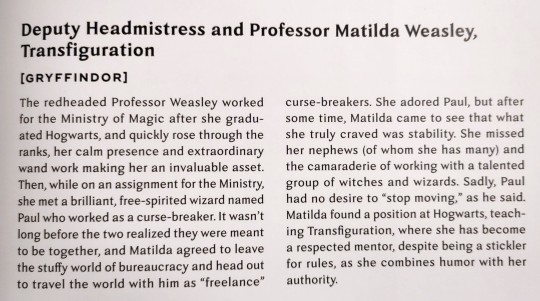
In this it says that she worked for the Ministry (where she was an 'invaluable asset', being sent on 'assignments' 👀) and then became a 'freelance' curse-breaker after she met a dashing yound wizard and went off to explore the world. So that's slightly different than what Madam Kogowa says in-game. Between the two I trust the information that we get in-game more.
And besides, further in our conversation with Madam Kogawa, she says that she met Prof. Weasley when she was in Japan and they "coordinated defensive efforts" while Kogawa herself worked for the Japanese Ministry of Magic.

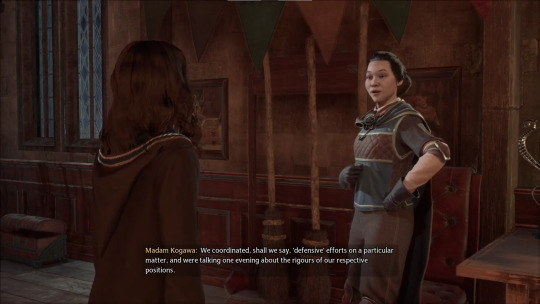
I don't about you but to me "defensive efforts" sounds more like the job of an auror and not a curse-breaker. And it definitely sounds like Prof. Weasley was working for the British Ministry of Magic at that time if she collaborated with Kogowa who was working for the Japanese Ministry. Kogawa also says that she cannot tell us the specifics of her work for the Japanese Minsitry, making it all sound like it's classified information!
In Madam Kogowa's office we also find a letter from Prof. Weasley:
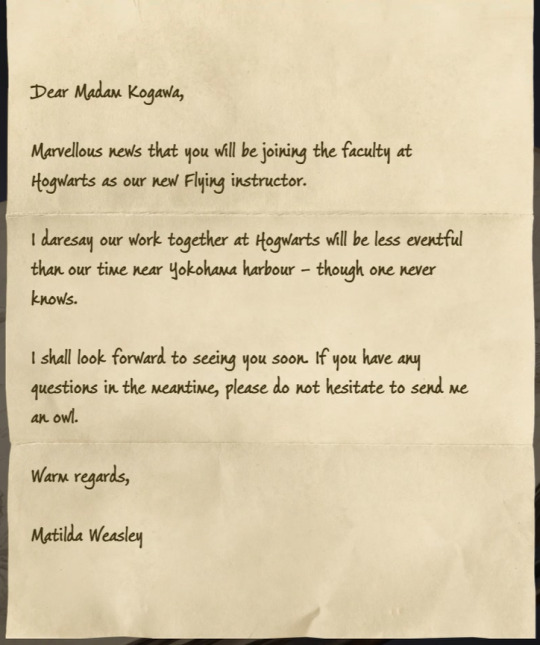
So we learn that they worked together near Yokohama harbour. A little research on Wikipedia tells me that Yokohama harbour was Japan's first port open to foreign ships. It opened in 1859 and after 1868 the port started trading a lot of silk with Great Britain.
But it looks like Prof. Weasley travelled a lot because she also met Prof. Onaï in Uganda. Prof. Onaï tells us that Prof. Weasley was well-known in the region and worked on "sharing magical knowledge between countries".

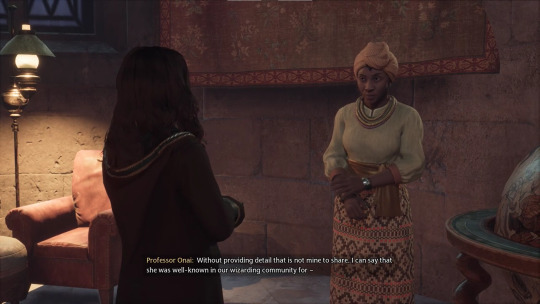
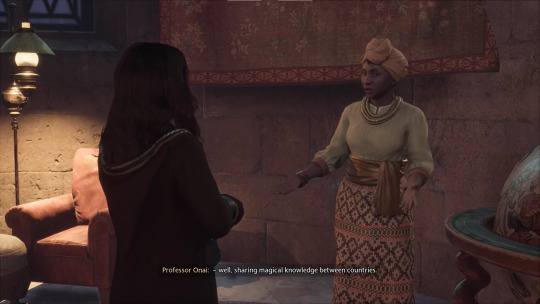
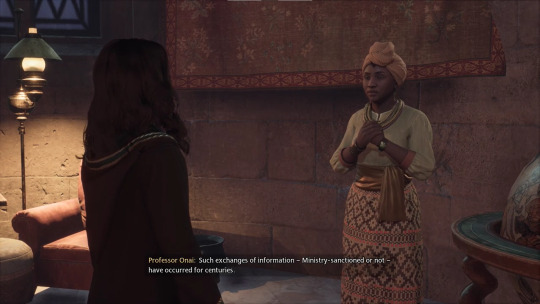
One thing that is remarkable though is that both Madam Kogawa and Prof. Onaï tell MC that we shouldn't ask Prof. Weasley about her time before Hogwarts. They both give the impression that whatever work Prof. Weasley was doing is something we shouldn't be talking about.
Anyway, with all that information, my impression is that Prof. Weasley was working as some kind of spy for the Ministry of Magic abroad. She used the whole 'freelance curse-breaker' as a cover and was either coordinating some secret military operations (like with Kogawa in Yokohama harbour) or making connections and gathering intel (in Uganda).
And it seems like some habits die hard because she is sort of spying on the students in Hogwarts too! She knows a lot about what MC but also Natty are up to. (At one point Natty says: "she knows more about me than I thought"). We also find this letter on her desk from the Minister for Magic himself thanking her for her thoughts on the seventh year students to recruit them for a job at the Ministry. So she is reporting some information about the students to the Ministry. But I suppose that is sort of normal for a deputy headmistress.
Anyway, all the secrecy intrigues me and I feel like there is a story there that we weren't told!
90 notes
·
View notes
Text
By Eli Lake and Danielle Shapiro
Since the October 7 massacre, a small “charity” based in Canada has been ubiquitous on elite college campuses, celebrating the bloodbath at public rallies and seminars. The group is called Samidoun, and it claims to be an NGO advocating on behalf of Palestinian prisoners in Israeli prisons.
On Tuesday, the U.S. and Canadian governments put an end to that charade.
Samidoun is not a charity at all. Rather, it’s a group “that serves as an international fundraiser for the Popular Front for the Liberation of Palestine (PFLP) terrorist organization,” according to a press release issued Tuesday by the Treasury Department. The government describes it as a “sham.”
For anyone who has followed the history of Palestinian terrorism, PFLP is a name you’re no doubt familiar with. It was founded in 1967 as a Marxist revolutionary group, and was supported during the Cold War by China and the Soviet Union. In 1976, the PFLP teamed up with West Germany’s Baader-Meinhof group to hijack a flight from Tel Aviv, Israel, to Entebbe, Uganda, separating Jewish and non-Jewish passenger hostages. Eventually, Israeli commandos freed the hostages. The episode was turned into the movie 7 Days in Entebbe.
For most of the 1990s and 2000s, PFLP was largely an afterthought for both Israelis and Palestinians (though it did murder an Israeli tourism minister in 2001). That began to change in 2019, when the PFLP killed a 17-year-old girl in the West Bank with a roadside bomb that also injured her father and brother. Since then, the government of Israel has pressed its allies to designate Samidoun as a terrorist front for the PFLP. The designations from Canada and the U.S. on Tuesday are the culmination of that effort.
One place where that designation will have an effect is elite campuses, where Samidoun has long established itself as a partner—and funder—for anti-Israel student initiatives. Just in the past year, Samidoun has co-sponsored a divestment rally at Princeton, taught an “Abolish Imperialism” lecture at Harvard Law School and, most infamously, led a “Palestinian Resistance 101” teach-in at Columbia University that resulted in the suspension of multiple student organizers who used the event to “promote the use of terror or violence.”
As far back as 2017, Princeton’s Palestine club shared links from Samidoun’s media page and encouraged students to work with the group on initiatives to free a Palestinian activist who had assaulted an Israeli soldier. In 2022, Princeton’s Palestine club again partnered with Samidoun to lead a “Palestinian Prisoner Letter-Writing Session” on campus. This long and close relationship between Princeton students and faculty and Samidoun has been replicated at top universities across the country.
Matthew Levitt, a senior fellow at the Washington Institute for Near East Policy and a former FBI analyst and deputy assistant secretary of the Treasury Department, told The Free Press that the U.S. and Canadian governments have debated over the last year about designating Samidoun a terrorist group. Their reservation was due to the fact that Western governments do not sanction organizations based just on violent and hateful speech. “They have been saying horrible and nasty things,” Levitt said. “We don’t designate people for saying nasty things.”
What turned the tide, according to Levitt, was that Israel had accumulated mounds of evidence that Samidoun was, in effect, a fundraising arm for the PFLP. Some of this information has been available for some time. For example, Israel’s Ministry of Strategic Affairs and Public Diplomacy released a report in 2019 that detailed Samidoun’s role in raising money for the PFLP. That report claims that PFLP operatives transferred money from Lebanon to a man named Khaled Barakat when he was living in Europe. On Tuesday, Barakat was also designated as a foreign terrorist financier. His wife, Charlotte Kates, is Samidoun’s “international coordinator.”
In 2022, the Netherlands barred Kates and Barakat from entering the country where they had planned to land and then drive to a pro-Palestine march in Belgium. More recently, Germany designated Samidoun as a terrorist organization in November 2023.
Even though PFLP has not captured the headlines of better-known groups like Hamas or Hezbollah, it remains deadly. Although it was not involved in the original planning for October 7, the terrorist group joined the massacre once it was underway. NGO Monitor has published PFLP statements and Telegram posts that show its participation in the 2023 attack, joining after the first wave of Hamas operatives.
32 notes
·
View notes
Text
Blaming Israel for Rescuing Its People
Hamas hid four hostages in a crowded civilian area and fired on rescuers.
Wall Street Journal
By The Editorial Board
It’s rare good news in a grinding war. On Saturday Israeli commandos rescued four hostages from two civilian buildings near the heart of Gaza’s Nuseirat market. It was a high-risk but well-planned and -executed mission that is a morale boost for Israelis.
Arnon Zamora was killed while leading the rescue mission at the head of his force. He will go down in history with Yoni Netanyahu, the fallen leader of Israel’s 1976 raid to free hostages in Entebbe, Uganda.
Noa Argamani, age 26, Almog Meir Jan, 21, Andrey Kozlov, 27, and Shlomi Ziv, 40, were all abducted during the music-festival massacre. A video showed Ms. Argamani begging for her life. Eight months later she heard a knock on the door: “It’s the IDF, we’ve come to rescue you.” She can now visit her terminally ill mother. Mr. Jan was mobbed on his return by friends chanting, “He is one of us, and we will never give him up,” a refrain of sports teammates now given new meaning. Mr. Jan’s father died hours before his son’s return.
The non-surprise is that professional anti-Israel voices, United Nations officials and the European Union foreign-policy chief rushed to attack Israel. Egypt condemned the operation “in the strongest terms.” How dare Israel rescue its own citizens. Didn’t it know there would be casualties? The BBC asked whether Israel gave a warning that the rescue raid was coming. Seriously? A tip-off to terrorists? Perhaps read them Miranda rights too.
“BREAKING: Gaza’s Health Ministry says 274 Palestinians were killed during the Israeli operation,” reports the Associated Press, only 48 hours after it had exposed how the Hamas ministry’s daily death tolls are “at odds with underlying data.” When will the media stop taking the kidnappers at their word?
Haters of Israel will blame it and excuse Hamas every time, and the media are easily manipulated into playing along. The Hamas figure is likely inflated, and it includes the terrorists killed trying to stop the rescue as well as those who hid the hostages.
Hamas started the war with a massacre, took these hostages and hid them in a crowded civilian area. Then, when Israel came to free them, Hamas responded with heavy fire, including RPGs—yet people are condemning Israel. It makes us wonder if the West has lost the moral discernment and instinct for self-preservation needed to defend itself in a world of killers.
Hamas could not survive if not for its enablers around the world.
44 notes
·
View notes
Text
by Rafael Medoff
It may seem perplexing that anybody would criticize Israel’s rescue of four hostages from Gaza. But in 1976, there was criticism of Israel’s rescue of hostages from Entebbe, too. In June 1976, Palestinian Arab terrorists hijacked a French plane on its way to Israel and forced it to fly to the Entebbe airport in Uganda. There they released the non-Jewish passengers, and held the remaining 106 passengers and crew hostage, demanding the release of terrorists who were imprisoned in Israel. Ugandan dictator Idi Amin was deeply sympathetic to the terrorists, and Ugandan soldiers helped the hijackers guard the hostages. On July 4, Israeli commandos raided the airport and freed the hostages. All seven terrorists, and several dozen Ugandan soldiers, were killed. The only rescuer killed was the raid’s leader, Yonatan Netanyahu, brother of Israel’s current prime minister. Mrs. Dora Bloch, an elderly passenger who had been taken to a local hospital, was murdered there by Ugandan soldiers.Most of the world celebrated the rescue raid on Entebbe. But not everybody. The Organization of African Unity, consisting of several dozen African countries, accused Israel of “wanton aggression” and demanded reparations for damage to the airport. The Soviet and Chinese governments denounced what they called “the Zionist aggression.” United Nations Secretary-General Kurt Waldheim charged that Israel had committed a “serious violation of the sovereignty” of Uganda. A few years later, Waldheim’s past as a Nazi war criminal was exposed. (However, that did not prevent his election as president of Austria in 1986.) The Mexican government criticized Israel’s “flagrant violation” of Ugandan sovereignty, and declared its “firm rejection of the use of armed force by any state as a means of trying to solve conflicts.” The Mexican position was especially surprising because just months earlier, it had explicitly promised to refrain from anti-Israel policies. That promise was made in order to secure an end to the boycott of Mexico announced by Jewish organizations following its support of the infamous Zionism-is-racism resolution at the U.N. in 1975.The French government’s response to the Entebbe rescue was particularly troubling, given the fact that it was a French plane that was hijacked, and French crew members who were held hostage. The French Foreign Ministry issued a brief statement which expressed satisfaction at the rescue, but emphasized its condemnation of the casualties, almost all of whom were the terrorists or the soldiers who assisted them. A spokesperson for the Air France crew read a statement hailing President Amin for his “constant care to ensure our safety, our material comfort and even our health.” The statement appeared to have been dictated by French officials. The U.S. government publicly praised the Israeli rescue mission, but it also introduced an “even-handed” resolution at the U.N. Security Council. While condemning the hijacking, the resolution also affirmed “the need to respect the sovereignty and territorial integrity of all States.” The resolution did not secure enough votes to pass, so it was withdrawn. At the same time — according to declassified documents — Secretary of State Henry Kissinger informed Israel’s ambassador in Washington that because the Israelis had used US equipment in the raid, “we will have to put a temporary freeze on military shipments.” Ambassador Simcha Dinitz replied: “You are kidding me.” Kissinger was not kidding. “
31 notes
·
View notes
Photo

Diplomatic missions of North Korea in European countries.
In a letter posted on the website of the People’s Communist Party of Spain last month, the Democratic People’s Republic of Korea, commonly known as North Korea, stated it was closing its embassy in Spain. The leaders of Angola and Uganda also received “farewell” visits from North Korean ambassadors recently, according to North Korea’s state media.
The South Korean Ministry of Reunification claims that a fourth of North Korea’s 53 diplomatic missions in the Americas, Africa, Asia, and Europe are also scheduled to close. Analysts say that the closure of these embassies is a sign that international sanctions are making it harder for North Korea to earn money.
What impact do you believe the closures will have on North Korea’s internal relations?
Sources:
“Fin de la misión diplomática de la República Popular de Corea en el estado Español.” Partido Comunista de los Pueblos de España. 28 October 2023.
“N. Korea closes embassy in Spain following shutdown of missions in Africa.” The Korea Times. 1 November 2023.
O’Carroll, Chad. “North Korea to close embassy in Spain due to sanctions: Spanish political party.” NK News. 1 November 2023.
by anthro.atlas
61 notes
·
View notes
Text
Right-wing American Christian groups that oppose sexual and reproductive rights are significantly increasing their spending in Africa, according to a new data analysis published ahead of a U.S. election, which could prove pivotal to abortion access both inside and outside the country.
Research by the nonprofit Institute for Journalism and Social Change (IJSC) found that 17 groups increased their Africa spending by 50% between 2019 and 2022, the most recent year for which data is available. The researchers say the data represents only a handful of Christian Right groups but indicates that they are making an increasingly concerted effort to influence abortion policy internationally as well as domestically.
A 2020 investigation by openDemocracy revealed that $54 million dollars flowed from mostly the same U.S. Christian Right organizations to Africa between 2008 and 2018. In Africa, their activities range from helping like-minded politicians obstruct key reproductive health legislation to supporting domestic groups in their fight against progressive abortion-related court rulings—tactics borrowed from the anti-abortion playbook in the United States.
While abortion laws have slowly liberalized across the continent, reproductive rights advocates say campaigning by American right-wing groups that brand themselves as “pro-family” could reverse those changes.
“The work of these groups has multifaceted effects on the continent,” said Martin Onyango, senior legal adviser for Africa at the Center for Reproductive Rights, a U.S.-based advocacy group. “We have seen a proliferation of anti-rights legislation on the continent of Africa, from Ghana to Uganda to Kenya to Malawi. We have groups that are now proposing legislation in parliament to take away fundamental rights—access to reproductive health care—that have been in place on the continents for decades.”
Many of the groups named in the report have close ties to former President Donald Trump and his administration and have influenced Trump on reproductive rights issues. Several are on the advisory board for Project 2025, a set of policy proposals seen the probable playbook for a second Trump term.
American anti-abortion groups have campaigned in Africa for decades in tandem with their fight at home. Bolstered by conservative Republican politicians, the 1973 Helms Amendment, which limits the use of U.S. foreign aid for abortion, was passed after the Supreme Court’s Roe v. Wade ruling. President Ronald Reagan then enacted the Mexico City policy, known as the global gag rule, which restricts U.S. funding to any international organization that provides, or even counsels on, abortion. The U.S. Christian Right has found Africa, with its strong tradition of Evangelical Christianity, fertile ground for further promoting and spreading its ideology. The result is a global movement that unites anti-abortion groups, religious leaders, and politicians around a common goal: eliminating the right to safe, legal abortion services worldwide.
Despite some liberalization, abortion remains highly restricted in many African countries. As of 2022, abortion was essentially illegal in six African countries and permitted only to save the life of the mother in another 13 countries.
Research has shown that banning abortions increases maternal mortality due to unsafe abortions. As of 2019, sub-Saharan Africa had the highest abortion case-fatality rate of any world region, at roughly 185 deaths per 100,000 abortions, a total of 15,000 preventable deaths every year.
Uganda’s Penal Code prohibits abortion except to save the mother’s life. In 2015, the Ministry of Health approved standards and guidelines on the provision of safe abortion, but those were quickly withdrawn. Onyango says this was partly due to lobbying by right-wing groups, including Family Watch International (FWI), a fundamentalist Arizona-based Christian organization whose spending in Africa increased nearly five-fold from 2019 to 2022.
Court cases challenging the withdrawal of those guidelines have not yet been heard, says Onyango.
“When they’re set for hearing, the bench is quickly reconstituted and the exercise starts again from ground zero,” he said. “And it is not by default. It is by clear design that that conversation is not intended to be concluded.”
According to reproductive rights advocates, American right-wing groups are playing the long game in Africa.
“Kenya, Uganda, Ghana appear to be the epicenter of a lot of anti-rights action, and that is where they build a lot of their strategy before exporting them to other countries. … When they leave Kenya, they go down to Malawi, and they replicate the same actions,” said Onyango.
Abortion was illegal in Kenya until 2010, when a new constitution permitted the procedure in a handful of circumstances, including during emergencies or if the life or health of the mother is in danger. Subsequent court decisions allowed abortions in cases of rape and incest and expanded the definition of “health” to include mental health.
But access remains limited, and studies have shown that most Kenyans have limited or inaccurate knowledge of their country’s abortion laws and policies. The legal landscape is confusing, even for medical providers who hesitate to perform the procedure to avoid criminal prosecution.
Ever since Roe v. Wade was overturned in the United States in 2022, reproductive rights advocates have worried that the same thing could happen in Kenya.
“We export a lot of our values and cultures from the United States, so the Roe v. Wade decision was completely misinterpreted here, because in our setting what we got was that abortion has been made illegal in the United States. That’s the message that we got because Roe was overturned,” said Dr. Ernest Nyamato, associate director of quality of care at the reproductive health care nonprofit IPAS.
In Kenya, a conservative group called the Kenya Christian Professionals Forum (KCPF) is appealing two recent court decisions: one affirming that abortion is a fundamental constitutional right, making the arrest of patients and providers illegal, and a second upholding the constitutional right to access abortion when there is a risk to the pregnant person’s health.
The KCPF’s chairperson, Charles Kanjama, denies receiving funding from any American organizations. But its annual report shows that its parent organization, the African Christian Professionals Forum (ACPF), was sponsored in 2023 by FWI. That same year, FWI’s president, Sharon Slater, was a featured speaker at ACPF’s annual conference.
FWI said it was unable to provide comment on this story within the requested time frame.
Part of the challenge of tracking the funding flows is a lack of transparent documentation. “We’re treating what we found as the tip of the iceberg,” said Claire Provost, co-founder of the IJSC. “We didn’t capture all funding from U.S. anti-rights actors into Africa. It’s a diverse and evolving ecosystem, with new organizations being set up all the time.”
The influence of these groups is clearly visible. Their members share training materials with African organizations, travel to the continent for conferences, and sponsor events such as Kenya’s March for Life, an annual demonstration against abortion, says Saoyo Tabitha Griffith, a Kenyan lawyer and women’s rights advocate.
In 2019, Nairobi hosted the ICPD25, a global population and development conference. Across the street from the venue, a few hundred people gathered in opposition to sexual and reproductive rights, including several groups tracked by the IJSC.
Former Trump administration delegates, including Valerie Huber, who was U.S. special representative for Global Women’s Health, were also there. Huber was a chief architect of the Geneva Consensus Declaration, a document submitted by the United States to the United Nations that encourages governments to improve women’s health care without abortion. She now travels across Africa promoting anti-abortion ideology for her nonprofit, the Institute for Women’s Health (IWH), another Project 2025 sponsor.
In a statement, an IWH spokesperson wrote that no IWH funds had been spent in Africa, other than for routine travel expenses, and that IHC has not provided any grants to African groups or individuals, is not partnering in Kenya, and has no plans to increase spending in Africa.
Huber hopes “to improve health and thriving for women, their children, their families, and their communities through high-quality, research-based policy guidance to nations,” the spokesperson wrote.
America’s global abortion policy seesaws back and forth depending on which party holds office, and Griffith said she witnessed years of damaging changes during Trump’s presidency. “I do not think I want to even imagine what a Trump reelection would mean for the women of Kenya,” she said.
9 notes
·
View notes
Text
Burkina Faso's military junta has announced a ban on homosexual acts, making it the latest African state to crack down on same-sex relations despite strong opposition from Western powers.
Homosexuality was frowned upon in the socially conservative West African state, but it was never outlawed.
Justice Minister Edasso Rodrigue Bayala said the junta's cabinet had now approved legislation to make it a punishable offence, but he did not give further details.
The military seized power in Burkina Faso in 2022, and has pivoted towards Russia after drastically reducing ties with former colonial power, France.
Homosexual acts were decriminalised in Russia in 1993, but President Vladimir Putin's government has been cracking down on the LGBTQ community, including banning what it calls "propaganda of non-traditional sexual relations".
The doctor forced to fight jihadists in Burkina Faso
Nigeria-EU deal sparks false claims over LGBT rights
The Nigerian queer parties that offer liberation
Burkina Faso's decision to outlaw homosexual relations is part of an overhaul of its marriage laws.
The new legislation, which still needs to be passed by the military-controlled parliament and signed off by junta leader Ibrahim Traoré, only recognises religious and customary marriages.
"Henceforth homosexuality and associated practices will be punished by the law," the justice minister was quoted by AFP news agency as saying.
Capt Traoré took power in September 2022 after overthrowing another military ruler, Lt Col Paul-Henri Damiba, accusing him of failing to quell an Islamist insurgency that has gripped Burkina Faso since 2015.
Burkina Faso was among 22 out of 54 African states where same-sex relations were not criminalised.
Unlike in many former British colonies, it did not inherit anti-homosexuality laws after independence from France in 1960.
Muslims make up around 64% of Burkina Faso's population and Christians 26%. The remaining 10% of people follow traditional religions or have no faith.
Many African states have been taking a tougher stand against the LGBTQ community in recent years.
Uganda is among those that have adopted legislation recently to further crack down on the community, despite strong condemnation from local rights groups and Western powers.
In May, its Constitutional Court upheld a tough new anti-gay law that allows for the death penalty to be imposed for “aggravated homosexuality”, which includes having gay sex with someone below the age of 18 or where someone is infected with a life-long illness such as HIV.
Activists said they would appeal against the ruling.
The World Bank has halted new loans to President Yoweri Museveni's government while the US has stopped giving Ugandan goods preferential access to its markets, following the adoption of the legislation last year.
Mr Museveni defended the legislation as preserving traditional family values, and said Uganda would not allow the West to dictate to it.
The daughter of Cameroon's president drew mixed reaction after she came out as a lesbian last week.
Brenda Biya, who lives abroad, said she hoped that her coming out would help change the law banning same-sex relations in the country.
Cameroon has been ruled with an iron-hand by her 91-year-old father, Paul Biya, since 1982.
In Ghana, parliament passed a tough new bill in February that imposes a prison sentence of up to three years for anyone convicted of identifying as LGBTQ+.
However, President Nana Akufo-Addo has not signed it into law, saying he will wait for the courts to rule on its constitutionality.
The finance ministry has warned him that if the bill became law, Ghana could lose $3.8bn (£3bn) in World Bank funding over the next five to six years.
Ghana is suffering a major economic crisis and received a bailout from the International Monetary Fund (IMF) last year.
15 notes
·
View notes
Text

https://www.reuters.com/world/us/hurricane-milton-weakens-it-marches-across-central-florida-homes-destroyed-2024-10-10/
8 notes
·
View notes
Text
Iam Shafic (Hope Shadick son ) on Facebook and on Instagram (Bbuye children ministries), am a member of Bbuye children ministries an organization that helps orphans and homeless childrens here in Uganda Africa brothers and sisters in Christ over there we are calling upon your help and prayers 🙏 ❤
#deadpool#jesusisgod#prayer#belief in jesus#jesus loves you#jesus is coming#jesussaves#faith in jesus#jesus christ#american believe
4 notes
·
View notes
Text
Gabon has reported its first case of mpox in a man who had returned from a trip to Uganda, its Health Ministry said.
Cases of the infectious disease, formerly known as monkeypox, have been surging in East Africa, but have also been detected in Asia and Europe.
The 30-year-old who lives in Gabon had "returned from a two-week trip to Uganda, which has been impacted by the epidemic," the ministry said in a statement on Thursday, August 22.
"The patient is in a good state generally (...) and has been put in isolation," it added. The Health Ministry said the country was on "maximum alert" for the virus, and it was "reinforcing its preparations against mpox coming into Gabon." It added that it was also preparing a "nationwide surveillance and testing system."
Mpox is a virus transmitted to humans by infected animals that can also be passed from human to human through close physical contact. While mpox has been known for decades, a new more deadly and more transmissible strain – known as Clade 1b – has driven the recent surge in cases.
Clade 1b causes death in about 3.6% of cases, with children more at risk, according to the World Health Organization, which has declared an international health emergency over the latest outbreak.
Le Monde with AFP
2 notes
·
View notes
Text
UGANDAN ORPHANAGE WORKER DYING OF TYPHOID AND MALARIA:
Please help!!!

Update: 50/100 $ reached. Just need 50$ more!!!
This man works for an orphanage called God Provides in Uganda. He is the hardest working man I've ever known. He is extremely ill with both typhoid and malaria and has been for about three days now.
They don't have any money and he was only able to get one treatment that my family paid for but unfortunately we don't have any money left that we can donate. He recently was able to graduate from college despite all the hardships he faces. He will be up for days while starving to walk to the villages and beg for help because they have nothing to eat most times and can hardly ever make rent.
This man has a future and the children need him, please do not let this be the end of him!
Even sharing this would be a big help and a huge difference. Please find it in your heart to take a moment to share this, tell friends about it or consider donating.
Thank you and bless you
Here is their Twitter as well:
https://twitter.com/GODPROVIDESMIN?s=20&t=HteqF3ZyaDPMJStVAHOtDQ
If you have any questions feel free to message me or @mahougirlmutualaid or @lemontoastcloud
Thank you!
#orphanage#emergency donations#god provides#christian faith#uganda#protect black children#gofundme#please help#prayer#orphans#education#signal boost#godislove#Godprovidesorphanage#tags for visibility#markiplier#wendigoon#scott cawthon#fnaf#dawko#jacksepticeye#christmas#holidays#voltron
83 notes
·
View notes